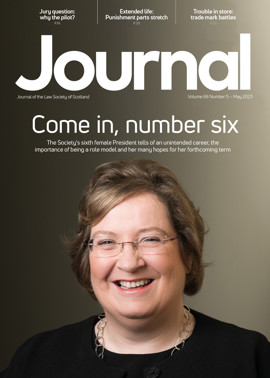Risk: Death and taxes – the perils of survivorships

As Benjamin Franklin (supposedly) once said, nothing is certain except death and taxes. Depressing, perhaps, but possibly true.
Mindful of this certainty, solicitors often have to be that pessimistic voice of “what if”, during a happy and exciting moment in their clients’ lives – when clients are purchasing a property with a spouse or partner. At that time, the clients will more likely be picturing new bathroom suites and kitchen configurations – not necessarily relationship breakdowns and untimely deaths.
However, at the risk of spoiling the moment, it is important that, when taking the clients’ instructions in this situation, and advising them on what might seem to the clients like mundane legal technicalities, the solicitor advises on the options and the potential implications of those options, so that the client can provide instructions that properly reflect their needs and circumstances.
Just as importantly, the solicitor needs to be able to evidence that they have done this. Because a rather depressing likelihood (although hopefully not a certainty) is that, if and when a client finds themselves with an unintended or unwelcome title outcome down the line, the decision making which led to it will be looked at in unforgiving hindsight. It will likely not reflect any optimism or lack of interest and concern on the client’s part which might have existed at the relevant time.
One such mundane technicality is the question of how the title to the property ought to be taken. The focus of this piece is survivorship destinations.
Survivorship destinations – the pros and cons
Survivorship destinations may have fallen out of fashion in more recent times. Previously they were inserted into dispositions, perhaps without much thought, and perhaps without specific instructions from the clients. However, they are not necessarily the relic that many consider them to be.
Many couples purchasing a house together, if asked to contemplate the worst case scenario, might say that, in the event of their death, they would want their share of the jointly owned property to pass automatically to their spouse or partner. One obvious advantage to this is the immediate nature of the transfer and comfort in knowing that, if the worst happens, there will be an uncomplicated transfer of the title to the parties’ home, regardless of whether the parties have wills in place. In circumstances where the share in the property is the main asset in the deceased’s estate, and where it is the specific wish of each party that the other inherits the property, it might be suitable for the clients, on the basis that it could reduce estate administrative costs.
Against that, however, when contemplating the use of a survivorship destination, the clients should be considering how this might sit with their other wishes and plans, for example a wish to pass their estate to children (which can be especially relevant where the clients have children from previous relationships). In addition, the clients’ IHT planning might be adversely impacted by the use of a survivorship destination. It might also have an adverse impact for clients with concerns about future care home costs, given that the entirety of the property will become part of the survivor’s estate.
One of the key factors cited against the use of survivorship destinations is their inflexibility. They can be overridden only in very limited circumstances, such as where the parties agree to evacuate the provision, where the parties divorce or there is a dissolution of their civil partnership. However, not all parties who separate ultimately divorce and, in many cases, the parties might not be in a marriage or civil partnership. In that instance, the party who wants to evacuate the survivorship clause is prevented from doing so unless the other agrees.
It is likely not for the solicitor to advise on issues of financial or tax planning at the point of acting in the purchase. However, from a risk perspective, it is advisable for a solicitor to flag potential issues with their clients, so that the client can consider what steps they may wish to take, including whether they wish to obtain other advice.
Evacuate! Evacuate!
It is possible to evacuate a survivorship destination.
It may go without saying that, in the event that a solicitor receives proper instructions from clients to evacuate the survivorship destination, they take steps to carry out that instruction, rather than delay. We have seen claims arising where the instruction was overlooked or else its implementation delayed.
However, by the time it is clear that the survivorship destination is not suitable (or is no longer suitable) for the clients, it may well be too late for it to be evacuated. One party may refuse to the evacuation of the survivorship clause. Take, for example the situation where the request is only made after the breakdown of the relationship. Unless the parties ultimately divorce or dissolve their civil partnership, the wish of one party cannot override the refusal of the other.
There is also the risk that, at the point in time when it becomes clear that the survivorship destination is not suitable, one of the parties may no longer have capacity to evacuate it. The inherent unsuitability of the survivorship destination might only become apparent after one of the parties has died.
From a risk perspective, it is also important to take the title into account when advising clients on the preparation of a will. There is no point in the client setting out wishes and bequests which will never be capable of being implemented, due to the terms of the title. A failure to consider this with clients at the time of will drafting could potentially give rise to a claim, perhaps from a disappointed beneficiary.
Points to consider
Death and taxes might well be certainties. Claims and complaints don’t need to be.
When acting for clients in a purchase, the solicitor should make the clients aware that, far from being a mundane technicality, the way that they choose to take title might end up being very significant for them at a later date. Explain this to the clients, and evidence that you have explained it. File note and follow up.
Ultimately, the decision is a matter for the client. It is not incumbent on the solicitor to unearth every potential consideration in their clients’ lives and tell them what to do. However, what the solicitor can do is to try to put this at the forefront of their clients’ thinking and give them the information to allow them to make a decision which is suitable for them, or else to allow them to take whatever further advice they consider necessary.
Perspectives
Features
Briefings
- Civil court: Spotlight on the Sheriff Appeal Court
- Employment: Must do better – the s 23 approach
- Human rights: Crime, detention and mental health issues
- Pensions: A question of tax
- Scottish Solicitors' Discipline Tribunal: May 2023
- Family: The slide rule of grave risk
- In-house: A route to diversity







